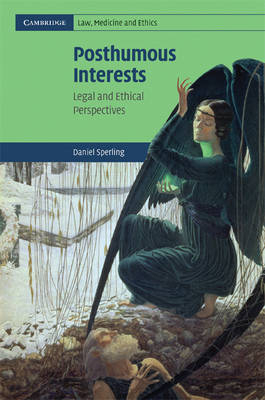
Posthumous Interests
Legal and Ethical Perspectives
Seiten
2008
Cambridge University Press (Verlag)
978-0-521-87784-8 (ISBN)
Cambridge University Press (Verlag)
978-0-521-87784-8 (ISBN)
The legal status of posthumous interests is explored and analysed, specifically in three categories of interest arising in the medico-legal context: the proprietary interest in the body of the deceased, the testamentary interest in determining the disposal of one's body after death and the interest in post-mortem confidentiality.
Daniel Sperling discusses the legal status of posthumous interests and their possible defeat by actions performed following the death of a person. The author first explores the following questions: Do the dead have interests and/or rights, the defeat of which may constitute harm? What does posthumous harm consist of and when does it occur, if at all? This is followed by a more detailed analysis of three categories of posthumous interests arising in the medico-legal context: the proprietary interest in the body of the deceased, the testamentary interest in determining the disposal of one's body after death and the interest in post-mortem medical confidentiality. Sperling concludes that if we acknowledge the interest in one's symbolic existence and legally protect it, not only do some interests survive a person's death but we should also enjoy a peremptory legal power to shape in advance our symbolic existence after death.
Daniel Sperling discusses the legal status of posthumous interests and their possible defeat by actions performed following the death of a person. The author first explores the following questions: Do the dead have interests and/or rights, the defeat of which may constitute harm? What does posthumous harm consist of and when does it occur, if at all? This is followed by a more detailed analysis of three categories of posthumous interests arising in the medico-legal context: the proprietary interest in the body of the deceased, the testamentary interest in determining the disposal of one's body after death and the interest in post-mortem medical confidentiality. Sperling concludes that if we acknowledge the interest in one's symbolic existence and legally protect it, not only do some interests survive a person's death but we should also enjoy a peremptory legal power to shape in advance our symbolic existence after death.
Daniel Sperling is Professor of Philosophy of Law and Bioethics at the School of Law, Netanya Academic College, Israel.
1. Posthumous harm, posthumous interests and symbolic existence; 2. Posthumous rights; 3. Proprietary interest in the body of the deceased; 4. Determining the disposal of one's body after death; 5. Medical confidentiality after death; Conclusion.
| Erscheint lt. Verlag | 8.5.2008 |
|---|---|
| Reihe/Serie | Cambridge Law, Medicine and Ethics |
| Verlagsort | Cambridge |
| Sprache | englisch |
| Maße | 155 x 235 mm |
| Gewicht | 600 g |
| Themenwelt | Medizin / Pharmazie ► Medizinische Fachgebiete ► Medizinethik |
| Studium ► Querschnittsbereiche ► Geschichte / Ethik der Medizin | |
| Recht / Steuern ► Allgemeines / Lexika | |
| Recht / Steuern ► EU / Internationales Recht | |
| Recht / Steuern ► Öffentliches Recht | |
| Recht / Steuern ► Privatrecht / Bürgerliches Recht ► Berufs-/Gebührenrecht | |
| ISBN-10 | 0-521-87784-9 / 0521877849 |
| ISBN-13 | 978-0-521-87784-8 / 9780521877848 |
| Zustand | Neuware |
| Haben Sie eine Frage zum Produkt? |
Mehr entdecken
aus dem Bereich
aus dem Bereich
Die Geschichte eines Weltzentrums der Medizin von 1710 bis zur …
Buch | Softcover (2021)
Lehmanns Media (Verlag)
CHF 27,90
von der Antike bis zur Gegenwart
Buch | Softcover (2024)
C.H.Beck (Verlag)
CHF 16,80
Krankheitslehren, Irrwege, Behandlungsformen
Buch | Softcover (2024)
C.H.Beck (Verlag)
CHF 55,90


